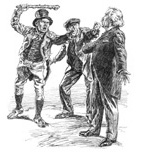
Cardinal Mindszenty & His Small, Honest Nation
A PORTRAIT OF COURAGE AT GREAT COST
József Pehm was born in Mindszent, a small village in the Austro-Hungarian Empire, in 1892. Ordained a priest in 1915, he adopted the name Mindszenty in 1941 to emphasize his Hungarian ethnicity, in defiance of the Nazis, who were threatening all of Eastern Europe. In 1944 Pope Pius XII made him a bishop, and in 1945 he was made an archbishop and the primate of Hungary. Throughout his life, József Mindszenty was an outspoken, politically active defender of humanitarian principles. This led to his arrest by the different regimes that ruled Hungary over the course of his life.
Mindszenty’s first imprisonment was from February 19 to May 15, 1919, when he was a leader in the Christian Party and edited a paper critical of the revolutionary Hungarian Democratic Republic (HDR). The HDR gave way to the short-lived Hungarian Soviet Republic in 1919. This new communist regime also viewed Mindszenty as an opponent and a problem, and arrested him again. After several harrowing days, during which his life hung in the balance, Mindszenty was sent back to live with his parents in his home village.
During most of World War II, Hungary sided with Nazi Germany, but since it remained unoccupied, it became a refuge for European Jews. In the spring of 1944, however, the Germans invaded Hungary, under the pretext of safeguarding communications, and immediately issued anti-Jewish laws and restricted Jews to ghettos. The Vatican protested vigorously and regularly against the inhumane treatment of the Jews in Hungary, as did all the Hungarian bishops, including Mindszenty, who was bishop of Veszprém at the time. Catholic churches in Hungary offered conversion to thousands of Jews to save them from persecution and deportation — until the Nazis caught on and began going after the converts.
The official Hungarian head of state at the time, Admiral Miklós Horthy, complained to the German occupiers that he was being bombarded with telegrams from the Vatican and others, and that the papal nuncio was calling on him several times each day, protesting the deportations. In the face of this backlash, Horthy withdrew his support from the deportation process, making it impossible for the Germans to continue. In a cable to Pope Pius XII, Horthy wrote, “It is with comprehension and profound gratitude that I receive your cable and request you to be convinced that I shall do all within my power to make prevail the demands of Christian humanitarian principles.” More than 170,000 Hungarian Jews were thus saved from deportation on the very eve of their intended departure. The Nazis, however, were not easily dissuaded.
You May Also Enjoy
Catholicism in 1980s Estonia amounted to one shunned priest living in a closet; his flock numbered fewer than a half dozen souls.
Socialism rejects the salvation of Jesus Christ and insists that man can be “freed” through the destruction of Church, family, and community.
The Origins of Totalitarianism. By Hannah Arendt.
Hannah Arendt’s The Origins of Totalitarianism was published…

